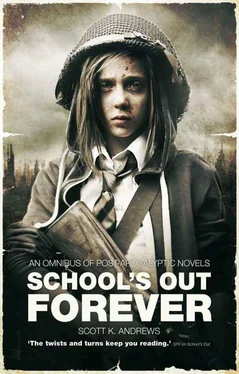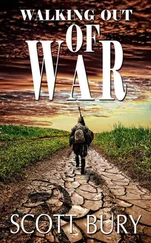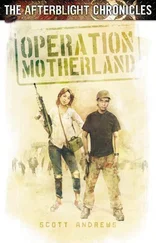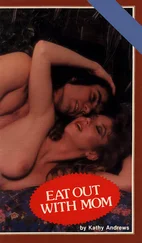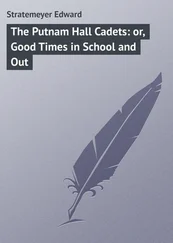Hildenborough elected Bob as their new leader. We developed close ties with them, and even played them at cricket once a month. A few of their adults came to live with us, mostly those with surviving children. I made it clear to the parents that I was in charge and any adults were here strictly by the permission of the children.
One market day Mrs Atkins came back to school with a tubby, red faced, middle-aged man, and she moved him into her room without ceremony or hesitation. His name was Justin, and the two of them made the kitchen into the hub of the school. They were always in there cooking something up, and all the boys loved to hang out there. It felt homely, which was something none of us had felt for a long, long time.
Our searches had found no trace of the Blood Hunters, but they had allowed us to compile a very good map of the area’s settlements and farms. We made contact with as many as would allow us to approach, and although it was early days I could sense the beginning of a trading network.
Once I was sure that the school was secure and running smoothly, we began to look for new recruits. There were plenty of orphaned kids in the area, running in packs, or living with surrogate families. Seventeen new children joined us, ten of whom were girls. A few tentative romances blossomed. Two women from Hildenborough volunteered to teach classes, and so each morning for two hours there were lessons. We didn’t have a curriculum to follow, so they just taught whatever took their fancy. Both of them were naturals, so although attendance wasn’t compulsory they always had a full house.
Green’s theatre troupe was a roaring success, too. They abandoned Our Town in the end, and produced a revue that they took to Hildenborough and some other nearby settlements. They were our finest ambassadors.
In spite of the sunshine and goodwill we didn’t neglect the military side of things. We maintained a strict defence plan, with patrols and guard posts, and every Friday we did weapons training and exercises. I devised a series of defensive postures for possible attacks, and we drilled the boys thoroughly in all the permutations; if someone came looking for a fight they’d find us ready and waiting.
Every now and then we’d catch a whiff of something happening in the wider world, rumours of television broadcasts and an Abbot performing miracles, but our fuel was long gone so we couldn’t tune in. Whatever was brewing in the cities couldn’t reach us out here in the countryside. Not yet, anyway. So we carried on building our little haven and prepared for the day when either madness or order would come knocking on our door again.
I flatter myself that I was a pretty good leader. The boys would come and talk to me when things were bothering them, and I did my best to resolve disputes and sort out any issues. I think I was approachable and fair. You could hear laughter in the corridors of Castle again, something I never heard when Mac was in charge. I relied on Norton and Rowles to let me know when and if I got things wrong, and they weren’t shy about knocking me down a peg or two when necessary.
As my wounds healed I continued exercising my leg and found that my limp became much less marked. My cheek did scar slightly from Baker’s ring, and Norton joked that it made me look like an Action Man. Within a couple of months I felt as fit and healthy as I’d ever done.
None of this stopped the nightly visitations of the dead keeping me awake, of course.
And there was still no sign of my dad.
I WENT THREE whole months without picking up a gun.
Felt good.
Couldn’t last.
THE WOODHAMS FARM was about two miles south-west of the school. A collection of outbuildings and oast houses around a Georgian farmhouse, it was inhabited by ten people who’d moved down from London after The Cull. They’d found the place empty, moved in and started running the farm, which boasted a huge orchard and fields devoted to fruit production, including grapes and strawberries. Mrs Atkins met them at Hildenborough market and they’d extended an invitation for Green and the theatre group to visit their farm for the weekend. The boys would put on their show and in return they would put the boys up, feed them, and let them bring back some fruit for the rest of us. Lovely. What could possibly go wrong?
Jones was one of our new recruits. His parents were dead but he’d been living in Hildenborough ever since The Cull. He was a good pianist, so Green had recruited him for the revue, and he’d fitted in well. Green’s troupe had left for the Woodhams place in a horse-drawn cart, so when Jones came staggering through the front gate after midnight the duty guards raised the alarm.
“I’d just played the opening chords of After Fallout when there was a knock on the door,” he told us. “Ben Woodhams got up to answer it, we heard a struggle at the door and then a gang of men burst in wearing balaclavas and waving guns around. Green put up a fight and he got hurt pretty badly. I managed to slip out in the confusion and I’ve been running ever since. It’s about two hours or so now. You need to hurry!”
Me, Norton, Jones, Rowles, Haycox and a new kid called Neate, who fancied himself a soldier boy, were dressed, armed and saddled up within ten minutes. There was no moon and we rode blind to the edge of the farm, but we could see flickering candle light around the edges of the curtains.
“There are seven boys and ten adults in there,” I said. “Jones reckons there were four or five gunmen, that right Jones?”
He nodded.
“We’ve got no idea what’s going on in there,” I continued. “They might just be looting the place, they might have decided they like the look of it and want to move in, they might be doing any number of things. Our advantage is that they don’t know we’re coming, so we should have surprise on our side. The hostiles are dressed all in black and had balaclavas on.”
“Why?” asked Norton.
“What?”
“Why were they wearing balaclavas? Were they afraid of CCTV or what? Doesn’t make sense.”
“I don’t know. Probably just for effect.”
Norton didn’t look convinced.
“Haycox and Neate, you cover the front door,” I said. “I don’t want you to shoot any of the hostiles unless necessary. If they make a run for it let them go. But if they try to leave with hostages I want you to fire off some warning shots and force them back indoors. We need to try and contain them.
“The rest of you are coming with me. Everyone was in the living room when they were attacked, and that’s at the front of the house so we’re going in the kitchen door at the back. We go in quietly and cleanly, and we keep an eye out for sentries. We use knives until such time as they become aware of us, after that you can fire at will. Don’t take any chances, but only kill if you have to. Jones knows the house so he and I will take point. Questions?”
“Just… be careful everyone, all right?” said Norton. “I don’t like this at all. Something doesn’t feel right to me.”
I smirked. “Corny line!”
“I’m serious.”
We left the horses a safe distance away and approached on foot, knives drawn. There were candles burning in the kitchen but there was no-one inside. The door wasn’t locked and it didn’t creak. So far so good. The room still smelt of roast beef. I looked greedily at the pile of dirty plates as I tiptoed around the large wooden table. The interior door was open a crack. It led into a corridor that ran to the front door. A number of rooms opened out of it to the left and right, and at the far end there was a staircase on the left.
I couldn’t hear any voices and I couldn’t see anyone. Gesturing for the others to stay in the kitchen I pushed the door gently and got lucky again: no creak. The hallway was carpeted so I took a chance and walked to the living room door, which was ajar. I leaned in and listened. Total silence. I was just about to try the other doors when I heard a small cough from inside and then someone shushing the cougher.
Читать дальше
